Yo leo y tú escribes: una experiencia de lectura literaria y escritura creativa en un grupo de adultos con discapacidad intelectual
DOI:
https://doi.org/10.24310/isl.2.18.2023.17794Keywords:
Literary reading, creative writing, intellectual disability, rights approach,, independent livingAbstract
This article aimed to investigate the experiences of creative reading and writing of a group of adults with intellectual disabilities through the implementation of workshops that allowed them to redefine their relationship with literature. For this, a didactic experience was designed and implemented during the COVID-19 Pandemic period, allowing a group of 9 adults with intellectual disabilities to experience literary reading and creative writing in a space for recreation and emotional containment, sharing resources of expression and creativity that allowed them not only to enhance their independent life, from a rights perspective but also to develop creativity. The methodology was designed and implemented under the inclusive research model (Salmon et al., 2018) and from a qualitative paradigm. Among the main results are the identification of the reading and writing interests of the group, a didactic model that suggests activities and resources to address the creation of literary workshops for adults with intellectual disabilities and, finally, the primary evaluations of the Advisory Group regarding the experience of participating in these workshops.
Downloads
Metrics
References
Álvarez, T. (2010). Competencias básicas en escritura. Barcelona: Octaedro.
Ángel Muñoz, S. (2019). Estudio de la competencia lectora y escritora de alumnos con discapacidad intelectual de aulas inclusiva. Revista RETOS XXI, 3(1), 23-33. https://doi.org/10.33412/retosxxi.v3.1.2346
Baikie, K & Wilhelm, K. (2005). Emotional and physical health benefits of expressive writing. Advances in psychiatrics treatment. Journal of continuing professional development. 11:338-346.
Bombini, G. (2008). La lectura como política educativa. Revista Iberoamericana de Educación. Nº 46, p. 19-35.
Buckley, S & Perera, J.(2006). Lectura y escritura en estudiantes con síndrome de Down. Una visión de conjunto. Madrid-España: Edición CEPE.
Cassany, D. (2006). Tras las líneas: sobre la lectura contemporánea. Editorial Anagrama. Barcelona–España.
Cerrillo, P. (2016). El lector literario. México: Fondo de cultura económica.
Chaisiri, T. (2010). Implementing a Genre Pedagogy to the teaching writing in a University Context inThailand. Language Education in Asia. Vol 1, pp. 181-199.Chambers, A. (2007). Dime. Los niños, la lectura y la conversación. México D.F: Fondo de Cultura Económica.
Convención de las Naciones Unidas. (2006). Sobre los Derechos de las Personas con Discapacidad (UNCRPD).
Deatline-Buchman, A., & Jitendra, A. K. (2006). Enhancing argumentative essay writing of fourth-grade students with learning disabilities. Learning Disability Quarterly, 29(1), 39–54. https://doi.org/10.2307/30035531
Emerson, E. B., Davies, I., Spencer, K., & Malam, S. (2005). Adults with learning difficulties in England. 2003/4.
Frugoni, S. (2002). Escribir ficciones: un camino hacia la literatura. [Ponencia]. Jornadas de Enseñanza de la Literatura del Instituto del Profesorado Alicia Moreau de Justo. Buenos Aires, Argentina.
Harvey, A. G., & Farrell, C. (2003). The Efficacy of a Pennebaker-Like Writing Intervention for Poor Sleepers. Behavioral Sleep Medicine, 1(2), 115–124. https://doi.org/10.1207/S15402010BSM0102_4
García, J.-N., & de Caso, A. M. (2004). Effects of a Motivational Intervention for Improving the Writing of Children with Learning Disabilities. Learning Disability Quarterly, 27(3), 141–159. https://doi.org/10.2307/1593665
García, P. (2011). Escritura creativa y competencia literaria. Lenguaje y textos, 2011, no 33, p. 49-60.
Grant, G.W., Ramcharan, P., & Goward, P. (2003). Resilience, Family Care, and People with Intellectual Disabilities. International Review of Research in Mental Retardation, 26, 135-173.
González, C; Jarpa-Azagra, M., Catalán-Henríquez, S. y Vega-Córdova, V. (2023). Prácticas de lectura de textos no ficcionales de jóvenes con discapacidad intelectual. Revista Colombiana de Educación, (89), 320–339. https://doi.org/10.17227/rce.num89-17424.
Guillespie, A., Graham, S. (2014). A Meta-Analysis of Writing Interventions for Students With LearningDisabilities. Council for Exceptional Children, 80;4, 454-473. https://doi.org/10.1177/0014402914527238 Hyland, K. (2007). Genre pedagogy: Language, literacy and L2 writing instruction. Journal of Second Language Writing. 16 (2007) 148–164. https://doi.org/10.1016/j.jslw.2007.07.005
Stephen J. Lepore & Melanie A. Greenberg (2002) Mending Broken Hearts: Effects of Expressive Writing on Mood, Cognitive Processing, Social Adjustment and Health Following a Relationship Breakup. Psychology & Health. 17:5, 547-560, DOI: 10.1080/08870440290025768
MINEDUC, (2016). Recomendaciones para una Política de Desarrollo Curricular. Informe Mesa de Desarrollo Curricular. Unidad de Curriculum Educativo-UCE, junio 2016. http://www.curriculumenlineamineduc.cl/605/articles-35514_recurso_1.pdf
Miranda, A. M. (2016). Alfabetización en lectura y escritura en personas en situación de discapacidad intelectual. Revista Inclusiones. 1(3),115-145. http://hdl.handle.net/11181/4806
Munita, F. (2017). La didáctica de la literatura: hacia la consolidación del campo. Educação e Pesquisa, 43 (2), 379-392. doi: http://dx.doi.org/10.1590/S1517-9702201612151751
Munita, F. y Manresa, M. (2012). “La mediación literaria”. En: Colomer T. y Fitipaldi (Coords.). La literatura que acoge: Inmigración y lectura de álbumes. Venezuela: Banco del libro.
Pallisera, M; Fullana, J; Puyaltó, C; Vilà, M y Díaz, G. (2017). Apoyando la participación real de las personas con discapacidad intelectual: una experiencia de investigación inclusiva sobre vida independiente. Revista Española de Discapacidad. Vol. 5. Num.1.
Pennebaker, J. W. (1995). Emotion, disclosure, and health: An overview. In J. W. Pennebaker (Ed.), Emotion, disclosure, & health (pp. 3–10). American Psychological Association. https://doi.org/10.1037/10182-015
Petri, J., Embregts, P. J., Taminiau, E. F., Heerkens, L., Schippers, A. P. y Van Hove, G. (2018). Collaboration in inclusive research: competencies considered important for people with and without intellectual disabilities. Journal of Policy and Practice in Intellectual Disabilities, 15(3), 193-201. https://doi.org/10.1111/jppi.12248
Robledo, B. (2017). El mediador de lectura. La formación del lector integral. Santiago de Chile: Ibby Chile, Fundación SM.
Rodari, G. (2002). Gramática de la fantasía: Introducción al arte de contar historias. Barcelona: Planeta.
Saddler, B. (2006). Increasing story-writing ability through self-regulated strategy development: effects on young writers with learning disabilities. State University of New York-Albany. https://doi.org/10.2307/30035555
Salmon, N., Barry, A., & Hutchins, E. (2018). Inclusive research: an Irish perspective. British Journal of Learning Disabilities. 46, 4: 268-277. https://doi.org/10.1111/bld.12247
Schalock, R. L., Luckasson, R., & Tassé, M. J. (2021). Definición, diagnóstico, clasificación y planificación de apoyos para personas con discapacidad intelectual: un consenso emergente. Siglo Cero Revista Española Sobre Discapacidad Intelectual, 52(3), 29–36. https://doi.org/10.14201/scero20215232936
Sherman, C. K., & De La Paz, S. (2018). FIX: A Strategic Approach to Writing and Revision for Students with Learning Disabilities. TEACHING Exceptional Children, 50(4), 233–242. https://doi.org/10.1177/0040059918757944
Spencer, H; Vega, V; Exss, K; Jarpa, M y Álvarez-Aguado, I. (2020). Including intellectual disability in participatory design processes: Methodological adaptations and supports. In Proceedings of Participatory Design Conference 2020 - Participation(s) Otherwise (PDC '20: Vol. 1), June 15-20, 2020, Manizales, Colombia. ACM, New York, NY, USA, https://doi.org/10.1145/3385010.3385023.
Walker, B., Shippen, M., Alberto, P., Houchins, D., Cihak, D. (2005). Using the Expressive Writing Program to Improve the Writing Skills of High School Students with Learning Disabilities. Georgia State University. https://doi.org/10.1111/j.1540-5826.2005.00131.xWalmsley, J., Strnadová, I. & Johnson, K. 2018. The added value of inclusive research. Journal of Applied Research in Intellectual Disabilities. 31, 5: 751-759. https://doi.org/10.1111/jar.12431
Zuñiga, R. (2014). Creando pretextos para motivar la escritura creativa a partir de la percepción sensorial en personas invidentes: Una experiencia de taller de escritura creativa con personas invidentes en la sala de atención a discapacitados “Jorge Luis Borges” del Centro Cultural de Santiago de Cali. [Tesis para optar al Grado de Licenciado en Literatura]. Universidad del Valle. Colombia.
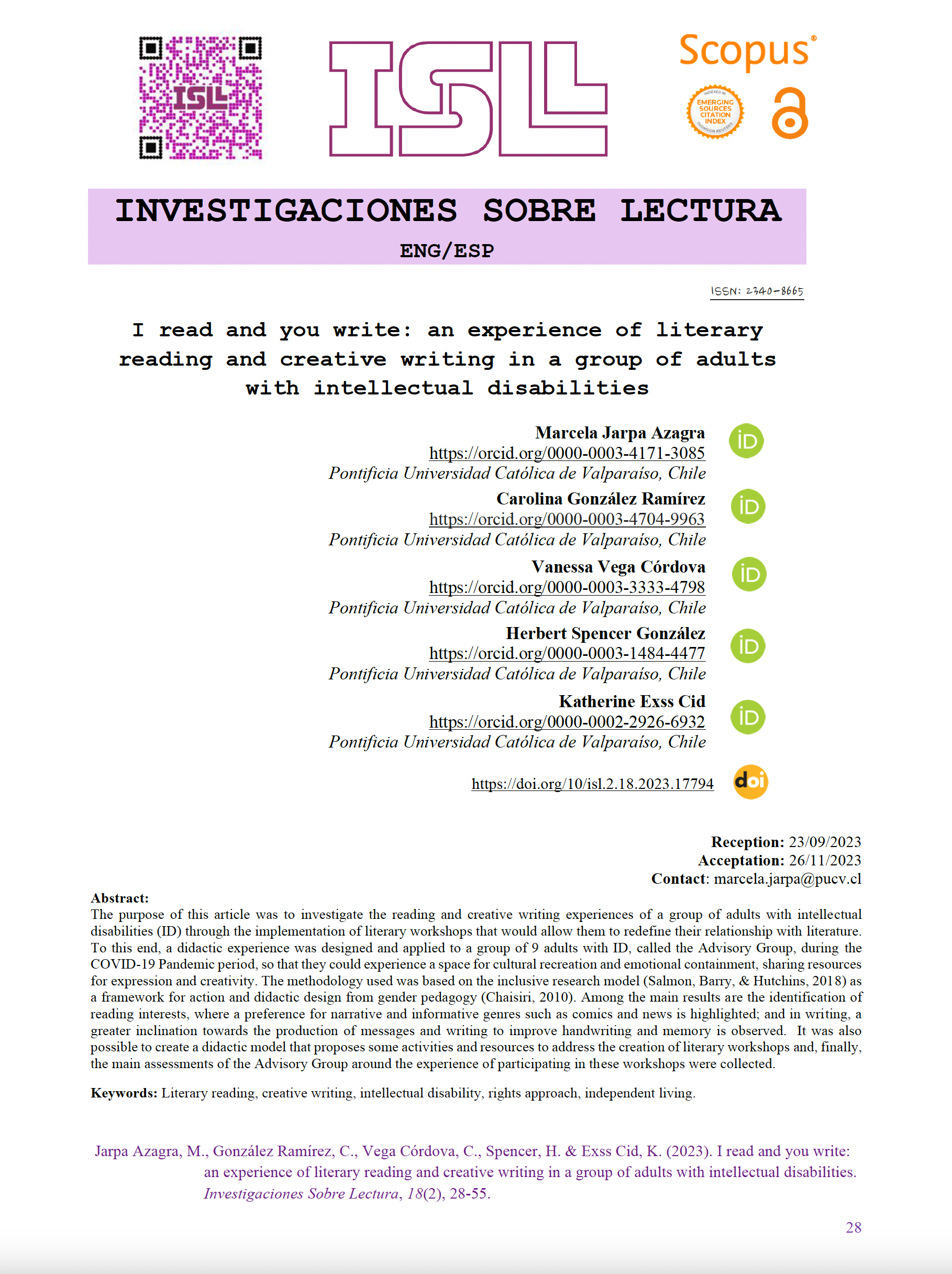
Downloads
Published
Versions
- 2024-01-02 (4)
- 2023-12-22 (3)
- 2023-12-22 (2)
- 2023-12-22 (1)
How to Cite
Issue
Section
License
Copyright (c) 2023 Marcela Jarpa Azagra, Carolina González Ramírez, Vanessa Vega Córdova, Herbert Spencer González, Katherine Exss Cid

This work is licensed under a Creative Commons Attribution-NonCommercial-ShareAlike 4.0 International License.
All contents published in Investigaciones sobre Lectura are protected under the Creative Commons Attribution-NonCommercial-ShareAlike 4.0 International (CC BY-NC-SA 4.0) license. All about this license is available in the following link: <http://creativecommons.org/licenses/by-nc-sa/4.0>
Users can copy, use, redistribute, share and exhibit publicly as long as:
- The original source and authorship of the material are cited (Journal, Publisher and URL of the work).
- It is not used for comercial purposes.
- The existence of the license and its especifications are mentioned.
There are two sets of authors’ rights: moral and property rights. Moral rights are perpetual prerogatives, unrenounceable, not-transferable, unalienable, imprescriptible and inembargable. According to authors’ rights legislation, Investigaciones sobre Lectura recognizes and respects authors moral rights, as well as the ownership of property rights, which will be transferred to University of Malaga in open access. The property rights are referred to the benefits that are gained by the use or the dissemination of works. Investigaciones sobre Lectura is published in an open access form and it is exclusively licenced by any means for doing or authorising distribution, dissemination, reproduction, , adaptation, translation or arrangement of works.
Authors are responsable for obtaining the necessary permission to use copyrighted images.

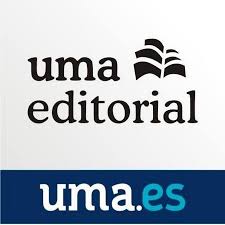
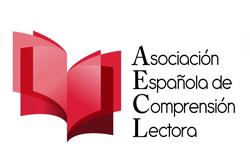
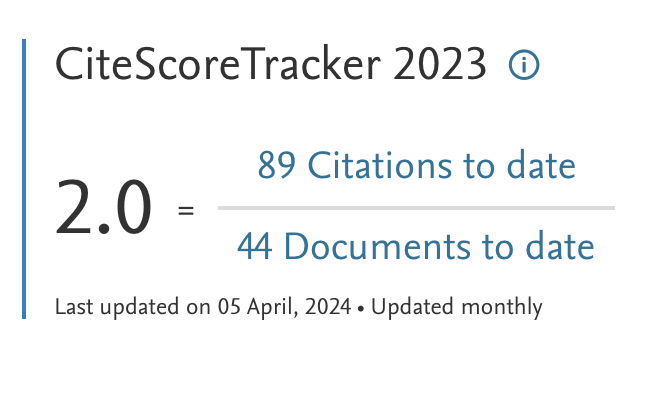
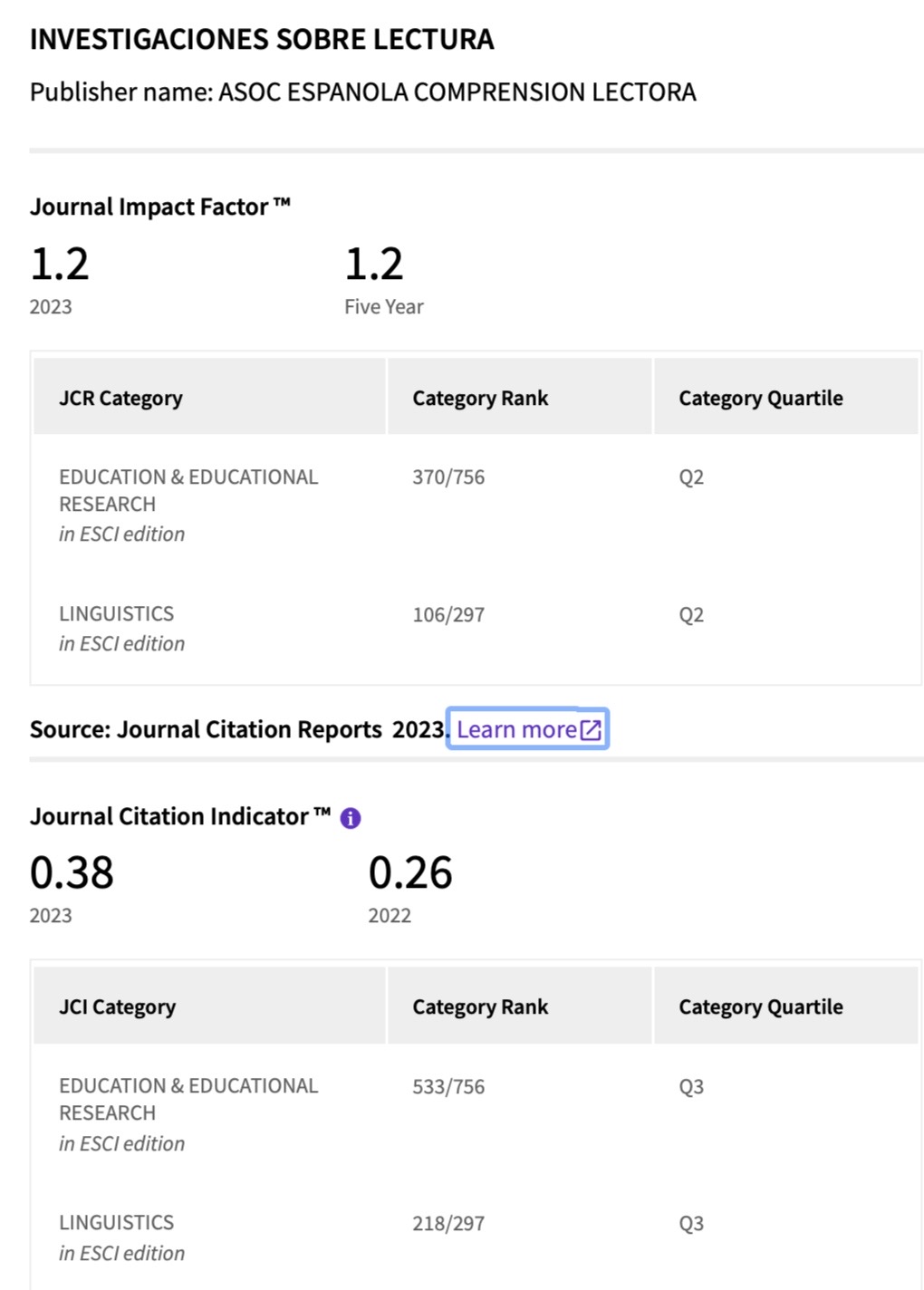
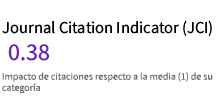
31.png)









